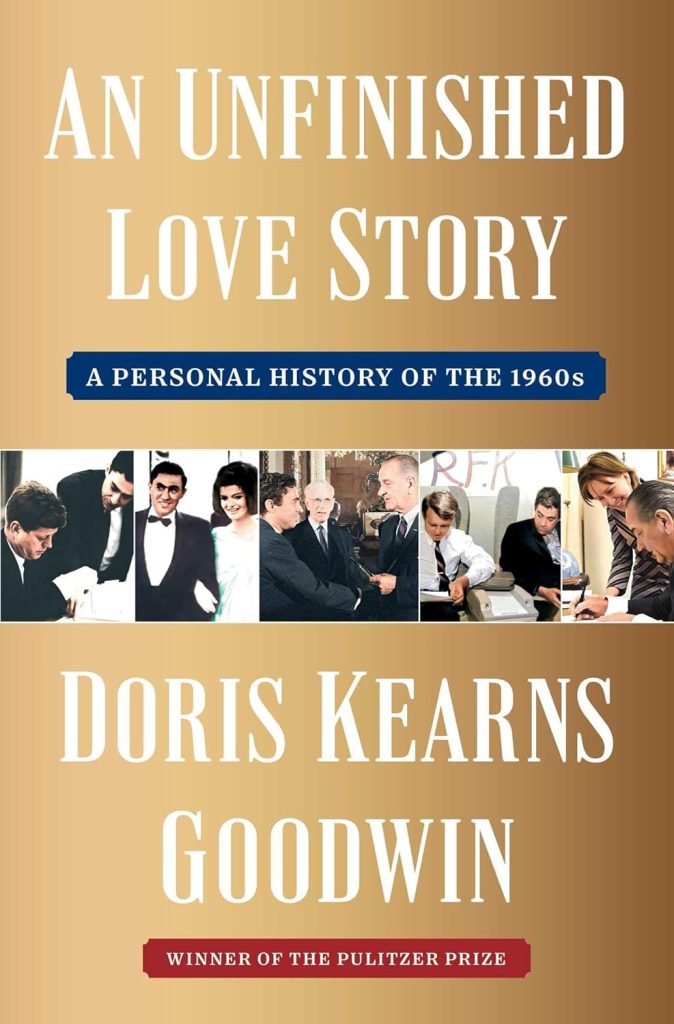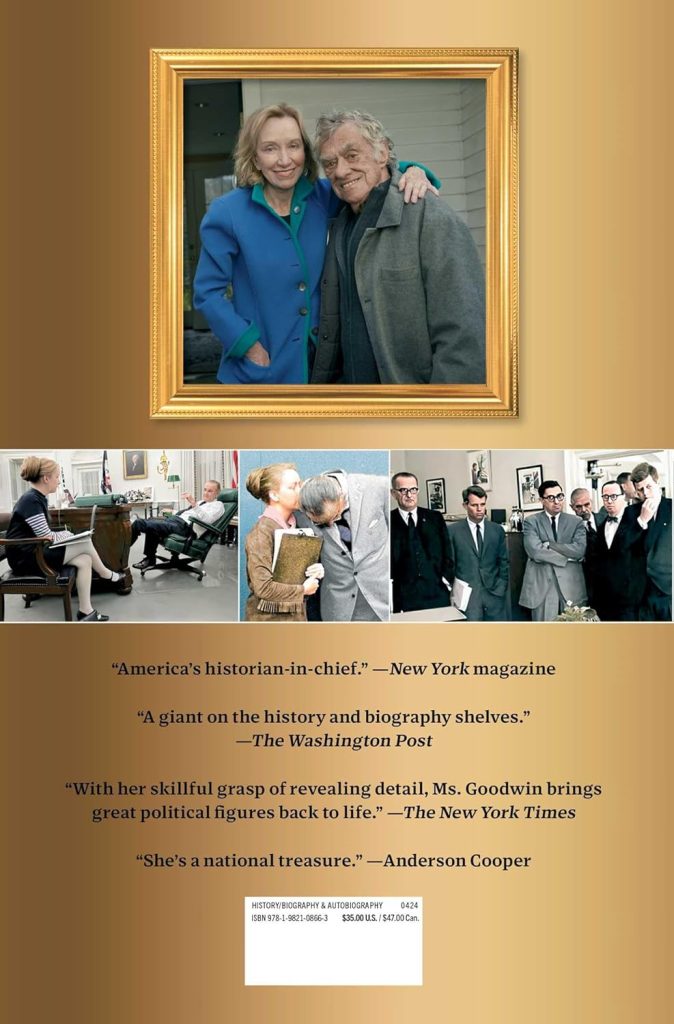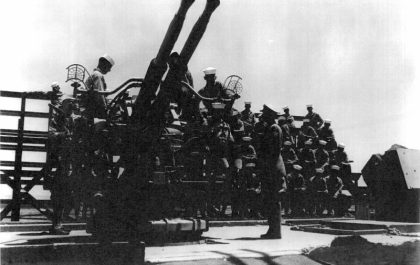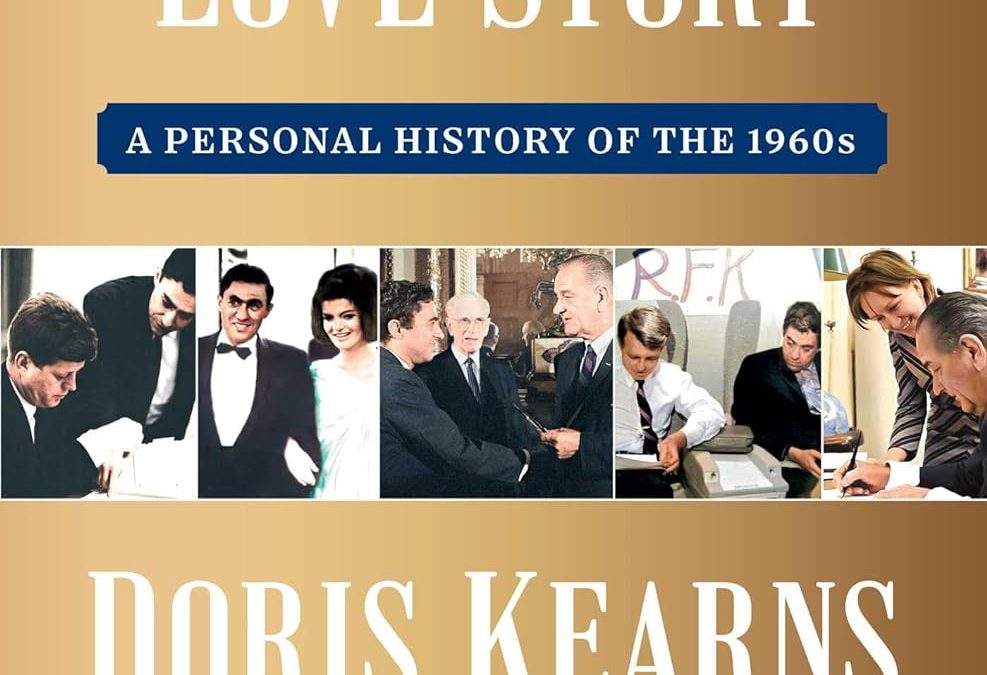
I have an affinity for the ways of the world at the moment of my birth. It was 1960 and even as my earliest personal memories date several years later, I see myself as a product of that decade, of the Sixties. When I first looked back, I realized I was born during the presidential administration of a man who played a pivotal role in securing American victory during World War II. After spending some more time with this chronology as a student and as a history teacher, however, I also realized—and then held onto with an oddly rabid tenacity—that my first breath also occurred during the presidential campaign of one John Fitzgerald Kennedy; not an old general from back in the day but a refreshingly youthful and inspirational leader with a beautiful wife and children playing on the lawn.
I am reflecting upon this so many decades later, after reading Doris Kearns Goodwin’s An Unfinished Love Story: A Personal History of the 1960s (2024). Reading this one so refreshingly re-oriented my take on the beginnings of me, that I now see our current state of affairs in an entirely new light; that the despair of our own days can be overcome. “The end of our country,” America’s preeminent presidential historian writes, “has loomed many times before. America is not as fragile as it seems.”
The 1960s ended with tragic violence that rocked the very foundation of this country and it is among this chaos where my own memories begin; not within the scope of my personal experience but, rather, through the accounts of war and riot and assassination broadcast daily into my home on television.
As an historian, I learned that the forgotten moments of my early years were filled with hope and that those hopes were dashed in Vietnam. And, in my American history classroom I presented this particular era with that sentiment. What I missed is the degree to which the promise of the early part of that decade was a pervasive force that reached across the nation; into the hearts and minds of millions of oppressed African Americans who came to believe that systematic racism might someday expire; and into the spirit of a massive generation of young people coming of age with the belief that America could stand as a beacon of good will for the entire world.
The personification of this promise and hope is none other than the husband of Doris Kearns Goodwin, Richard “Dick” Goodwin. When he turned 80 years-old in 2011, he decided it was finally time to go through over 300 boxes of personal records that he had held onto for decades. While this is certainly a “personal history” of the 1960s, An Unfinished Love Story is also a detailed political and social history of that decade.
I have long known that Doris Kearns Goodwin was a confidante of President Lyndon Baines Johnson. She became a White House Fellow during the final months of LBJ’s presidency and came to be very close to him. She was only 25. She then helped the charismatic Texan write his memoirs after he left office.
This experience with the bombastic former president led to Goodwin’s Lyndon Johnson and the American Dream (1976) which launched her career as a presidential historian.
What I did NOT know is that in 1975, this American treasure married a man who was at the center of the action during many of the defining moments of the 1960s. After serving as a law clerk to Supreme Court Justice Felix Frankfurter, Richard Goodwin became a key figure in the federal investigation into the TV quiz show scandal of the late 1950s (made into a 1994 film directed by Robert Redford and featuring Goodwin).*
After meeting Senator John Kennedy in 1959, Dick Goodwin—from Brookline, Massachusetts like JFK—joined the 42 year-old in his quest for the White House. Dick so impressed Kennedy that the young candidate invited him on board his “private plane for sixty-eight days of nonstop campaigning.”
With Kennedy’s victory, it seemed as if the nation had entered an entirely new era defined by tens of millions of baby boomers coming of age with an invigorated and spirited 43 year-old John Kennedy at the helm.
From 1961-1965, Dick served during both the Kennedy and Johnson administrations as an aid and speechwriter. During this time of hope and promise in America, he was not only a witness to some of the most compelling moments of the era; he helped craft many of the ideas that gained expression through the words that he himself wrote.
Chosen to secure the southern Democrat vote, Vice President Johnson was an outlier in the Kennedy administration. The two men could not have been more different. Following JFK’s assassination, there was friction between the Kennedy team that now gave way to Johnson and an entirely new sort of leadership. This became especially obvious as a distraught Bobby Kennedy, JFK’s attorney general, clashed with Johnson.
This division made it all the more astounding that the “Kennedy man” Dick Goodwin became one of LBJ’s most trusted advisers. At the same time, Goodwin continued growing his close friendship with Bobby Kennedy and his brother’s widow Jackie Kennedy.
These extremely personal relationships are documented in the boxes Dick Goodwin hauled around for so long. These papers also reveal an intimate portrayal of our nation’s history as it was experienced in the White House and beyond; all through the eyes of an idealistic young man who epitomized the youthful spirit of the 1960s.
“The story of [Dick’s] public life, as I have come to see it,” Doris writes, “is the story of a young man’s love affair with America—not the geographic bounds of the country, but the constellation of democratic ideals that lay behind its founding.” ULS 22

Kennedy is seen as the architect of many of the domestic initiatives that were put forth in this time, yet it was largely left to Johnson to implement them.
While Dick Goodwin’s work with Kennedy has him in the room while history is being made, his role in the early years of the Johnson administration sees him influencing LBJ’s policies and in many respects personally crafting the president’s public expression of these policies.
Two Johnson speeches dramatically illustrate Dick’s influence.
His language captured the essence of Johnson’s entire domestic agenda. In a speech that so eloquently expressed Johnson’s vision on the campaign trail, he told an Athens, Ohio audience on May 7, 1964: “And with your courage and with your compassion and your desire, we will build a Great Society. It is a society where no child will go unfed, and no youngster will go unschooled.”
On March 15, 1965, Johnson made an impassioned speech to a joint session of Congress in support of voting rights legislation. In one of the most famous lines delivered by a president, Johnson told the nation that “it is not just Negroes, but really all of us, who must overcome the crippling legacy of bigotry and injustice. And we shall overcome.” By adopting the language of the Civil Rights Movement – Goodwin’s idea – this speech legitimized and elevated the meaning of years of non-violent struggle throughout the segregated South.
“Your speech,” Martin Luther King telegraphed the next day, “was the most moving, eloquent, unequivocal, and passionate plea for human rights ever made by any president of this nation.”
“He had,” Doris Goodwin writes of Johnson’s speech, “transformed the lectern into a bully pulpit from which, as never before, he inspired, roused, and consolidated public sentiment across the nation.”
In the end, the Great Society included the Civil Rights Act of 1964 and the Voting Rights Act of 1965. The Medicare and Medicaid programs were born providing health care for the elderly and the poor. The Social Security Act of 1965 bolstered the New Deal program increasing benefits for retirees.
The National Foundation on the Arts and Humanities announced that the government had a responsibility to promote good works and deeds. As Dick Goodwin said to his wife, “Before long, the idea of the arts had grown until it seemed a necessary and integral ingredient of a healthy society. It led to basic issues of human dignity and social justice in an increasingly prosperous America.”
Other programs were signed into law including in support of public broadcasting on TV and radio, education, housing, rural development, economic opportunity, consumer protection, and welfare. The Department of Transportation was created to support America’s infrastructure. A number of environmental laws were passed to support clean air and water, endangered species, historic preservation, and support for outdoor trails and rivers.
Many view the Great Society as the most successful domestic agenda ever placed under law. It imagined an inspiring role for government underscored by the idea that the richest society on earth could care for those who needed support and provide opportunity for those who had been historically oppressed. Conservative critics had their say while today many of the aims of the Great Society are simply seen as part of the fabric of a well-functioning and healthy society.
However, by 1965, Lyndon Johnson began sending combat troops to Vietnam and by 1968 more than 500,000 American soldiers were fighting there. Largely due to his opposition to the war, and Johnson’s unwillingness to be straight with the American people, Dick Goodwin left the White House in 1965.
It was at this time that the Civil Rights Movement took a dark turn. While much of the movement focused on efforts to undo legal segregation in the South, it was the de facto segregation in other parts of the country that would erupt in violence. From 1964-1969, tens of thousands of rioters in hundreds of cities took to the streets destroying and looting property, and burning buildings to the ground. In many cases the National Guard was needed to quell the violence under martial law. In 1967 Detroit, President Johnson deployed the Army’s 82nd and 101st airborne divisions to the Motor City. Forty-three died, over 1100 were injured, over 7000 were arrested, and hundreds of buildings were destroyed.
While Dick Goodwin was no longer in the White House, he continued to take an active role in the political events of the day. He maintained his friendship with Bobby Kennedy and the two of them became outspoken critics of the Vietnam War.
After Bobby refused to challenge Johnson for the presidency in 1968, Dick Goodwin joined the campaign of Senator Eugene McCarthy who ran in opposition to the war. When Bobby finally decided to run for president after-all, Dick carried out his commitment to McCarthy and then joined Bobby’s campaign.
On March 31, 1968, Johnson announced to the nation that he would not be seeking an additional term. Just a few days later, on April 4, 1968, Martin Luther King was assassinated in Memphis, Tennessee. And, after winning the Democratic California primary, Bobby Kennedy was mortally shot on June 5, 1968. Dick Goodwin was at the hotel where RFK was assassinated and he marks this moment as the end of the 1960s.
At that time, Doris Kearns had joined the White House staff and was nurturing her relationship with Johnson. Her experiences and previous work combine wonderfully with her husband’s, who she did not meet until 1972.
There are so many more wonderfully intimate stories here; inspired by Dick’s papers but enhanced and corroborated through a copious collection of secret Lyndon Johnson recordings, Doris’ impeccable research, and most significantly, the interplay of the two as they reflect on our nation’s history and their proximity to it. And throughout, the reader is invited into their delightfully playful and intellectually enriching relationship.**
Dick died of cancer in 2018 at the age of 86. Their project together lasted over six years and its conclusion and publication is in keeping with a promise Doris made to Dick in his final days. It is one of the most enjoyable and enlightening books I have ever read.
*After completing the 1994 movie Quiz Show, director Robert Redford asked Richard Goodwin what he thought. Goodwin replied, “I’m the moral center of the story. I’m portrayed by a young good-looking guy. And I get to sum it all up with the last line, ‘I thought we were going to get television. The truth is, television is going to get us.’”
** In 2009, Richard and Doris Kearns Goodwin were interviewed by Charlie Rose.





